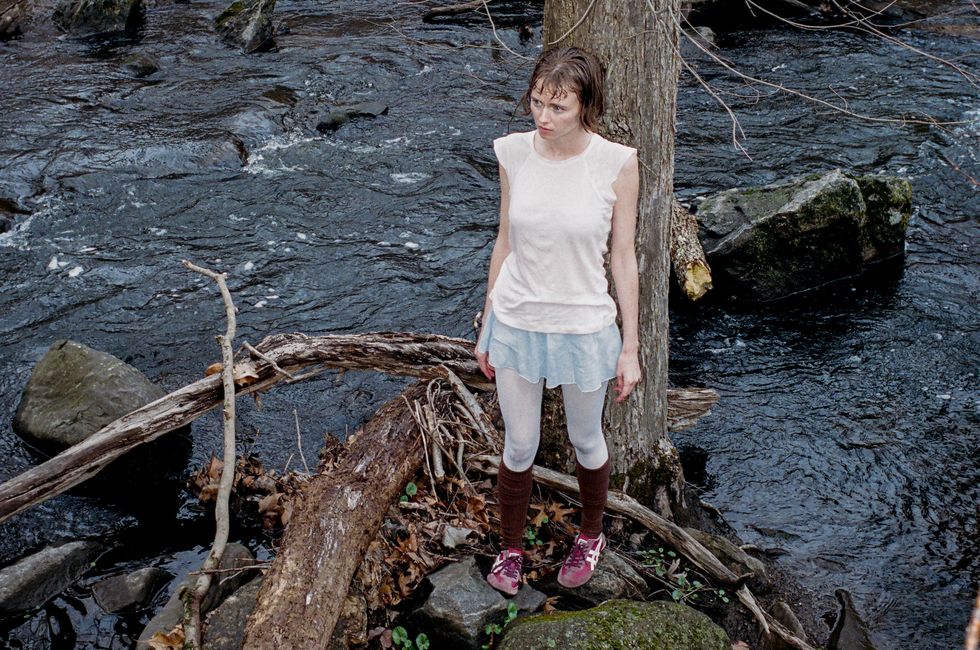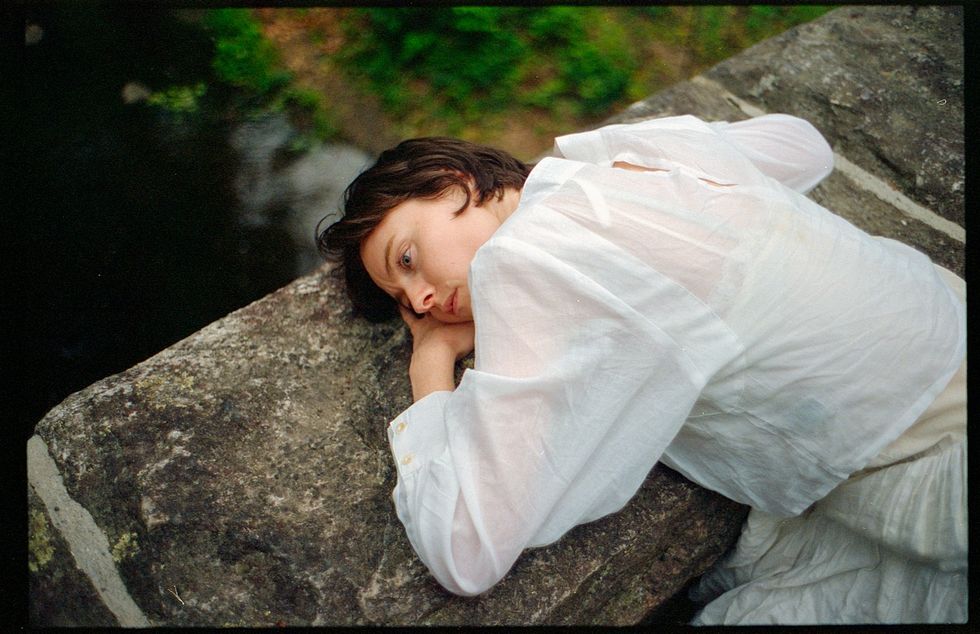
Skullcrusher Saves Herself on 'And Your Song Is Like A Circle'
By Tobias Hess
Sep 10, 2025Who do I live for?
It’s the question that opens Skullcrusher’s (Helen Ballentine) expansive, yet intimate, forthcoming album, And Your Song Is Like A Circle (out October 17 on Dirty Hit). Album opener, “March,” per the album title, does indeed mimic a sphere. Chords plod along, repeating slowly, voices and layers which crest, crescendo, then mournfully return to stasis.
The cyclical gesture of the music and lyrics on this album evoke the somber, sobering and rootedly hopeful nature of the time it was made. In the wake of the pandemic, Ballentine moved from Los Angeles where she had lived for over 10 years, back to upstate New York, to her mom’s, eventually moving on her own in Hudson, a bucolic, artistic town.
Many felt "disassociation" during this time, when so much of life was still mediated by screens and public health guidelines. Ballentine, though, was facing a particular challenge that further strained her ability to remain present. Her beloved cat, Finn, was deeply ill, and the only treatment for him wasn’t yet approved by the FDA, leading to a rather extreme DIY veterinary endeavor.
“[My] vet told me about this underground group of ladies who you could get this medicine from,” she shares with PAPER over Zoom. “I had to meet up with these ladies in these parking lots and buy this illegal drug for him. And then I had to inject him with this medicine for three months every day. It was really hard to do that.”
Being responsible for the survival of her animal added a suspense and gravity to this “lonely” period, which was already colored by a recent breakup and further physical and emotional distance from the family-like friend community she had formed in Los Angeles. “I can't remember that time well. It was such a weird blur,” she says. “Most of my memories are of me laying on the ground with [Finn],” describing the whole time as having the feeling of surrender, the image of “falling to your knees,” evoking the larger emotional sense of that period.
There was another thing contributing to the “maelstrom” of her life, though.
“I haven't mentioned this specifically [yet in interviews], but I think it’s important to give context,” she offers with hesitation before proceeding. “When I was in LA, I went to a psychiatrist for the first time and they put me on some medications, antidepressants and also anti-anxiety medication, which were benzos (like Klonopin) … I do get panic attacks,” she says. “Over the course of the next couple of years, I became addicted to Klonopin in a pretty bad way. That intensified throughout the time when Finn was sick, when I moved to Hudson. It just became harder and harder to deal with things.”
Thankfully, Ballentine was able to get treatment to safely get off of Klonopin this past winter, by which time she had finished the record. The record, then, is not “about” recovery, as she was still facing that battle while recording, but the album does evoke the sense of surrender, release and gritted teeth survival that comes with such an experience.
“Sometimes when you have a big thing like that, [the story] can become like, Oh, the record is about addiction,” she offers with caution. “It influenced [the record], but I think having that experience of saying, ‘I need to get help,’ was such a cathartic moment. Finishing the record and then going [to get help] ... was really powerful. I've moved on a lot.”
Today, Ballentine is releasing another offering from the album, “Dragon,” which evokes the thrust of the record via looping piano arpeggio, which are mirrored by a programmed drum loop, filtered and washed out as if it’s playing from a drum machine in the room over. Layers of vocals and fuzzed textures become the mist of the song as Ballentine sings, “The weight is heavy/And I fall to my knees.” A moment of surrender and release.
Its video shows a miniature version of Ballentine atop a desk, filled with trinkets, toys, and heirlooms, while a human-sized version of the artist sits beside her and sings. Blue light emerges and transforms the surreal scene into something even dreamier, a blur of ether.
PAPER spoke with Ballentine about nursing her cat back to health, the realities of recovery and finding solace in surrender.
[Helen Ballentine’s cat Finn comes on screen]. This is the famous cat!
I know, yeah. He's become a pretty prominent feature in this release. This is him.
What's his name?
Finn.
How long have you had Finn?
Almost four years.
I know Finn was part of the story of this album, so I'm curious to hear what happened with Finn and how that factored into this record?
I came back to my mom’s in New York without a plan. A month after I got there, Finn got really sick. There was not a treatment that was available yet … I think now there is. They legalized it, but it was not approved by the FDA and this vet told me about this underground group of ladies who you could get this medicine from.
I had to meet up with these ladies in these parking lots and buy this illegal drug for him. And then I had to inject him with this medicine for three months every day. It was really hard to do that, but it was either that or he dies. The stakes were very high and there was nothing that the vets could do. I spoke to a lot of them and they were like, “Look, it looks like this treatment has good results. We can supervise it and you can bring him in for checkups, but we can't administer this.” I did that and then he was okay, but it was crazy. I was in a state of disarray. I had to fully give myself over to this situation with him and just be there for him and care for him and then piece my life [back] together once that was taken care of.
This sounds like an incredibly intense and raw experience … so much responsibility on you as a caretaker. Where did the music fit in that process with him?
I can't remember that time well. It was such a weird blur. Most of my memories are of me laying on the ground with him. I was definitely writing at that time. I was at my mom's house, so I was definitely playing piano. It wasn’t an increase or a decrease in [my writing]. But a lot of the music, at least the sensations of the record, was beginning to surface at that time. The bulk of the actual writing was done afterwards when I was [living in] Hudson, New York and I was more on my own [and not dealing with my cat’s health]. [The time dealing with Finn’s health] felt like a really extended period of isolation that formed the roots of this writing process.
You mentioned the sensation of the record. I feel the scope, intensity and scale of it. I'm curious how you would define the sensation that you were reaching for here?
Across the board, it's a dissociative feeling. It's always interesting to talk about it afterwards, because I do feel like I'm in a different phase of my life now, so I'm trying to put myself back in that position a little bit. One of the feelings was a very palpable feeling of being outside of myself and looking at myself. There's a lot of references to this feeling of falling onto your knees. It was this period where I was like, “Okay, I surrender. I'm so tired. I'm in this storm right now and I'm just going to let myself be swallowed.”
Then the other image I remember thinking about was from reading this short story by Edgar Allan Poe called “Descent Into The Maelstrom,” which was very inspirational to me with this record. Most of it takes place from the perspective of these two guys who are like looking down onto a maelstrom and trying to conceive of it as they're looking at it … it’s beyond their ability to understand it. That idea was very relatable to me. It almost felt like I was on the precipice of some kind of powerful force. If I went closer to it, I would never escape from it.
When you're in a period of intense change in your life … you have to ride out the storm. But if you wander off and you suddenly get caught in the vortex, you will get sucked in and it's really hard to get out of that

To speak a bit more concretely about those changes: you moved across the country, there was your cat’s illness. Can you tell me a little bit of the story of that time in your life in relation to what came before it?
Having lived in LA for so long … I felt like I had a family there. I had friendships that were my way of feeling secure and safe. And the relationship I was in ended. And other relationships, other friendships, were feeling like they were changing. Especially post-COVID, something was off. When I moved [to New York] that revealed itself.
I was coming back to the place that I grew up in. I think about the time that I was making [my last album] Quiet The Room, which was about my childhood and my family. After I released that album, I healed a lot with my family. [When I moved to New York,] I felt like I lost my family that I had made in LA and then I came back to my blood family. It's been a process of rebuilding, but for a bit, I was just like, I don't have anything. It was a very lonely time. There were just a lot of things that still needed to be worked through with my family and it gave me the opportunity to do that, which was great.
I was in a phase of reckoning some of my mental health stuff. That definitely came to a head. I haven't mentioned this specifically [yet in interviews], but I think it’s important to give context. When I was in LA, I went to a psychiatrist for the first time and they put me on some medications, antidepressants and also anti-anxiety medication, which were benzos (like Klonopin) because I do get panic attacks. Over the course of the next couple of years, I became addicted to Klonopin in a pretty bad way.
That intensified throughout the time when Finn was sick, when I moved to Hudson. It just became harder and harder to deal with things. And Klonipin is quite dangerous to come off of, which I did not know. A lot of my feelings of dissociation and detachment from reality was influenced by that experience. And then this past winter — so it's not that long ago — I went to rehab. I was there for like 5 weeks and I was able to get off of it safely. It was a really good experience.
I had basically finished the record by then. Sometimes when you have a big thing like that, it can be like, Oh, the record is about addiction. It's influenced, but I think having that experience of saying, “I need to get help,” was such a cathartic moment. Finishing the record and then doing that and coming out of that period, was really powerful. I've moved on a lot, which is really nice, but it was very difficult.
You sharing this experience with me resonated with my experience with the record. For example, a song like “Exhale,” was a song that really resonated with me because of the grandeur of it … it just felt like it's moving beyond words and you're giving into something much, much bigger or a higher power. That aligns with the process of recovery.
It is really interesting because I had written that prior to going into recovery, but it was so cool how it all connected so much. We talk a lot about surrender, control and spirituality. I was thinking about these things so much prior to having that experience.

I know you developed a new vocal and recording technique. Did this process of surrender also affect your artistic experimentation?
Yeah, I think so. Maybe not in a very intentional way, but the desire to just release and relinquish control, influenced the way that I was recording my vocals, especially. We were always adding some kind of improvised vocal. That always felt so physical, emotional and present. The sense of presence that happens when you don't know what you're gonna do until you do it. It creates something that really can never be created again. I just accept that I don't have control over exactly how this will turn out. I like that about recording sometimes. This is a moment in time that we're gonna capture and it's just gonna be like that. It doesn't need to be perfect or anything. It doesn't need to be any particular way. Utilizing my voice in that way was really fun, just letting it out … oohing and ahing and sighing, getting the mic right up on my throat so I sounded like a demon: mostly the physical experience of letting it out in that moment was fun and felt good.
You go through this whole life artistic experience, and now the record is a done thing and an object that will be in the world. I'm just curious how the process of releasing it is striking you?
It's been good in a lot of ways, because it's an opportunity for me to recognize a lot of my growth, because I think at a certain point in my life releasing anything or having to be like “ this is done” was very hard. There's certainly still some anxiety about having to box this experience up. You can never communicate fully what an experience was. I have so much more acceptance for that. It's not about having it be a perfect window into my experience. That is mine to hold. Those are my own experiences and this is something that I'm now offering to other people and they will have their own experiences with it. There’s a moment of acceptance … it's moving from it being just your own to being out and and being out of your control. It's another opportunity: let something go and surrender to it. This is something else now. It's a great time to move on. I'm excited to release it, actually. You put in all this work and then you're talking about it, you're reflecting, and then you can distance yourself from it and move on to the next thing.
Photography: Adam Alonzo
From Your Site Articles
Related Articles Around the Web
MORE ON PAPER
ATF Story
Madison Beer, Her Way
Photography by Davis Bates / Story by Alaska Riley
Photography by Davis Bates / Story by Alaska Riley
16 January
Entertainment
Cynthia Erivo in Full Bloom
Photography by David LaChapelle / Story by Joan Summers / Styling by Jason Bolden / Makeup by Joanna Simkim / Nails by Shea Osei
Photography by David LaChapelle / Story by Joan Summers / Styling by Jason Bolden / Makeup by Joanna Simkim / Nails by Shea Osei
01 December
Entertainment
Rami Malek Is Certifiably Unserious
Story by Joan Summers / Photography by Adam Powell
Story by Joan Summers / Photography by Adam Powell
14 November
Music
Janelle Monáe, HalloQueen
Story by Ivan Guzman / Photography by Pol Kurucz/ Styling by Alexandra Mandelkorn/ Hair by Nikki Nelms/ Makeup by Sasha Glasser/ Nails by Juan Alvear/ Set design by Krystall Schott
Story by Ivan Guzman / Photography by Pol Kurucz/ Styling by Alexandra Mandelkorn/ Hair by Nikki Nelms/ Makeup by Sasha Glasser/ Nails by Juan Alvear/ Set design by Krystall Schott
27 October
Music
You Don’t Move Cardi B
Story by Erica Campbell / Photography by Jora Frantzis / Styling by Kollin Carter/ Hair by Tokyo Stylez/ Makeup by Erika LaPearl/ Nails by Coca Nguyen/ Set design by Allegra Peyton
Story by Erica Campbell / Photography by Jora Frantzis / Styling by Kollin Carter/ Hair by Tokyo Stylez/ Makeup by Erika LaPearl/ Nails by Coca Nguyen/ Set design by Allegra Peyton
14 October




